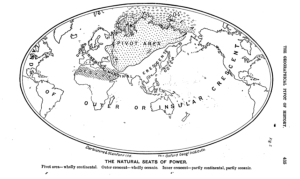No edit summary |
No edit summary |
||
| Line 1: | Line 1: | ||
'''Eurasianism''' (Russian: евразийство, ''yevraziystvo'') is a socio-political movement in Russia that emerged in the early 20th century which states that Russia does not belong in the "European" or "Asian" categories but instead to the geopolitical concept of Eurasia governed by the "Russian world" (Russian: Русский мир), forming an ostensibly standalone Russian civilization of which both contains elements of European and Asian | '''Eurasianism''' (Russian: евразийство, ''yevraziystvo'') is a socio-political movement in Russia that emerged in the early 20th century which states that Russia does not belong in the "European" or "Asian" categories but instead to the geopolitical concept of Eurasia governed by the "Russian world" (Russian: Русский мир), forming an ostensibly standalone Russian civilization of which both contains elements of European and Asian civilization. | ||
== Relation to Geopolitics == | |||
[[File:Pivot.png|thumb]] | |||
Eurasianism is heavily influenced by 20th century Geopolitical doctrine. In particular that of '''Mackinder''', whose famous 1904 paper, "The Geographical Pivot of History," has been formative for thinkers from '''Zbigniew Brzezinski''' to [[Alexander Dugin|Alexander Dugin.]] His paper was a landmark in conceiving geography in its relation to history, and examined the importance of the Eurasian Steppe in particular. <blockquote>Who rules East Europe commands the Heartland: Who rules the Heartland commands the World Island: Who rules the World Island commands the world.</blockquote> | |||
[[Category:Eurasianism]] | [[Category:Eurasianism]] | ||
[[Category:Ideologies]] | [[Category:Ideologies]] | ||
Revision as of 07:39, 23 January 2024
Eurasianism (Russian: евразийство, yevraziystvo) is a socio-political movement in Russia that emerged in the early 20th century which states that Russia does not belong in the "European" or "Asian" categories but instead to the geopolitical concept of Eurasia governed by the "Russian world" (Russian: Русский мир), forming an ostensibly standalone Russian civilization of which both contains elements of European and Asian civilization.
Relation to Geopolitics
Eurasianism is heavily influenced by 20th century Geopolitical doctrine. In particular that of Mackinder, whose famous 1904 paper, "The Geographical Pivot of History," has been formative for thinkers from Zbigniew Brzezinski to Alexander Dugin. His paper was a landmark in conceiving geography in its relation to history, and examined the importance of the Eurasian Steppe in particular.
Who rules East Europe commands the Heartland: Who rules the Heartland commands the World Island: Who rules the World Island commands the world.
